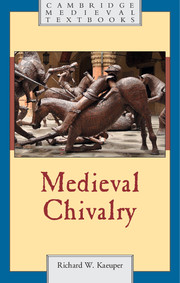Book contents
- Frontmatter
- Dedication
- Contents
- List of figures
- Acknowledgments
- Part I An approach to chivalry: was it real and practical?
- Part II Three broad chronological phases
- 3 Phase one: knighthood becoming chivalry
- 4 Phase two: knighthood and chivalry fuse
- 5 Phase three: chivalry beyond formal knighthood
- Part III The privileged practice of violence
- Part IV Chivalry, governing institutions, and ideals
- Part V The world of chivalric emotions
- Reflections
- Select Bibliography
- Index
3 - Phase one: knighthood becoming chivalry
from Part II - Three broad chronological phases
Published online by Cambridge University Press: 05 August 2016
- Frontmatter
- Dedication
- Contents
- List of figures
- Acknowledgments
- Part I An approach to chivalry: was it real and practical?
- Part II Three broad chronological phases
- 3 Phase one: knighthood becoming chivalry
- 4 Phase two: knighthood and chivalry fuse
- 5 Phase three: chivalry beyond formal knighthood
- Part III The privileged practice of violence
- Part IV Chivalry, governing institutions, and ideals
- Part V The world of chivalric emotions
- Reflections
- Select Bibliography
- Index
Summary
A thick European mist obscures the origins of chivalry, making close investigation difficult and hope of certainty doubtful. An analysis seeking general patterns may even prove perilous, for the landscape beneath the mist is crisscrossed by deep furrows of scholarly controversy, and contested ground, still heavily mined, is periodically swept by erudite gunfire. If this chapter attempts some generalizations, it recognizes that many questions await further investigation or at least scholarly willingness to observe truce.
Reasons for this degree of contention are not far to seek. The seedbed of chivalry must be sought in the Carolingian and immediately post-Carolingian era, a time abounding with unresolved interpretive issues. If scholars could agree on social, political, and cultural continuity from the ninth century through the eleventh century, or agree, instead, on the rise of transformative forces as the Carolingian regnum collapsed, historians of the origins of chivalry might plan extended holidays. Lacking such agreement, they find problems stubbornly clustering around such basic issues as the efficacy of centralized rule by Charlemagne and his successors. Did royal/imperial authority constitute a public governmental capacity with armies built on universal male service? Did this authority for a time effectively and closely rule this vast Carolingian land mass, only to see it fracture into privatized local rule by military strongmen, or does such a view perpetuate what R. I. Moore termed “the fantasy of a revived Roman empire with which clerical courtiers flattered their masters and themselves”? One or another approach to such issues could determine whether early knighthood arose during Carolingian rule, even at the Carolingian court, or only emerged from the rubble as this world fractured, leading to a rise of the knights.
To ask when and how chivalry emerged is thus to pose no simple question that can be settled with a precise birth date. Finding formative chivalric ideals and assessing their importance become crucial issues. So does discerning the early appearance of men who will be instantly recognizable as knights in both popular and scholarly views. Did these warriors constitute an emerging aristocracy with a distinctive style of living? Were they already features of a Carolingian world or rather a new group emerging from the mist? Did military function define them and slowly bind together fighting men at a variety of social levels?
- Type
- Chapter
- Information
- Medieval Chivalry , pp. 63 - 84Publisher: Cambridge University PressPrint publication year: 2016



